John Janaro's Blog, page 284
January 29, 2014
Three Years of Blogging: I Am Grateful For The Journey
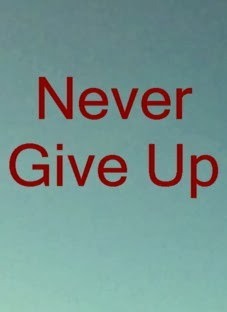 Happy Birthday to the Never-Give-Up-Blog,
Happy Birthday to the Never-Give-Up-Blog,Happy Birthday to the Never-Give-Up-Blog,
Happy Biiiiiiirthday to the Never-Give-Up-Blooooooooooog,
Happy Birth... well, you get the idea.
This blog is three years old today.
That's right, three years of writing fairly regularly and sometimes thoughtfully. For someone with my constraints, it means a lot to my own sense of... I dunno... "self-worth?"... (or delusions of grandeur or whatever) that I've kept this little enterprise going consistently for three years.
It began as a whim, an idea that I tossed out to my then small group of Facebook "friends" (which pretty much consisted of people I had known a long time, and also my former students):

So I got five "likes" and sixteen "comments" which was quite a response for me in those days. Many of the responses were simply "Yes!" (often with exclamation point). But these were people I trusted. Still, I wanted to know whether they were actually saying something more than just, "Sure. Go for it, man!" So I asked more precisely:

A small chorus of "Yes, we want to read YOUR blog" was raised in the combox. But these were people I knew, people who were dear to me in various ways, people who were able to perceive that I might be able to do something well. Notice how I have discreetly concealed their identities. Many of them know who they are, even if they rarely actually read the blog, hahaha (but don't worry about that... although, you could always start up now).
You gave me encouragement, dear good friends, and one of the things I want to do on this anniversary is say, "Thank you." (Of course the problem is that you're not reading this now, haha! If I get the chance I'll PM you the link to this post and thank you personally.)
Anyway, you convinced me, and on January 29, 2011 the first of more than 600 posts was proclaimed to the Facebook world:

It has been worth the effort, and remains so. I have discovered that the blog is a kind of literary genre in its own right. I have some frequent readers, more than enough to encourage me to keep writing. (Of course, as an incurable teacher, I only need a handful of people to give me the sense that I have "a classroom," even though sometimes the material here is unusual for a classroom, being so introspective, and sometimes painful.)
There is something about the charism of teaching that can't help being stirred up. It's an impetus that always wants to foster opportunities and places for learning and growing. It's so strong and so implacable that even when I'm suffering, even when I'm losing my mind, I want somehow to turn it into an opportunity for people to learn something. So I try to present my experience. I wrote a book about being sick. I wrote, and I continue to write about mental illness.
I try not to be didactic. Rather I try to walk on this journey together with everyone and observe the slopes and bends and surprising things on the path. I am the person who notices things and wonders at their beauty, their strangeness and even their scariness. Still I look and I try to see the significance of what I find along the way, and I can't help wanting to draw others over to look for themselves. "Come and look at this!" I want to say.
Even (indeed especially) if I find it inside myself.
For I am more convinced than ever that even down to the deepest depths we are all traveling together and we are all going to the same place. We must, therefore, help one another.
Published on January 29, 2014 12:10
January 28, 2014
The Day St. Thomas Aquinas Went Shopping
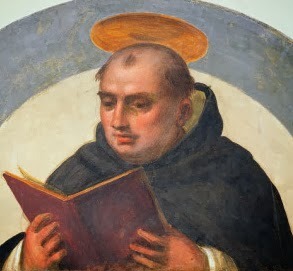 My favorite story about Thomas Aquinas is the one where a young novice in the community was sent by the Superior to grab "one of the other friars" and go buy some fish.
My favorite story about Thomas Aquinas is the one where a young novice in the community was sent by the Superior to grab "one of the other friars" and go buy some fish.This novice was very new. He saw only a community of more or less anonymous Dominican friars in black and white habits -- men who had committed themselves freely to vows of poverty, chastity, and obedience. The first friar the novice came upon was the stout, older fellow with a big brow who was pacing or perhaps sitting with his books and papers, pondering something and probably not looking very busy. The novice said to him, “The Prior wants you to go buy fish.”
Friar Thomas Aquinas was in fact engaged in doing his daily work: a work that was destined to play a singular role in the exposition and clarification of Catholic doctrine and theology; a work that also bequeathed to humanity philosophical breakthroughs that would lay foundations and open up new vistas in metaphysics and epistemological realism; a work that brought about the historical integration of Aristotle into the Christian west, and that established the charter for the reconciliation of faith and reason, thus opening the way in the future for so many great advances in the humanities and natural sciences; a work that also gave us the foundational exposition of a political philosophy that would shape what is best and most enduring in the emerging "modern" Western Civilization, and so many other things that bear upon what we need to learn now, in the dawn of the new epoch of the third millennium.
"The Prior wants you to go buy some fish" said the novice.
And then Thomas, without a word, closed his book, set aside his magnificent intellectual labors, and went off to the fish market.
Published on January 28, 2014 05:58
January 27, 2014
What Our Souls Seek
 The "Peace Cross" from Elementary Atrium
Lord Jesus, enfold us in your most compassionate heart and give us confidence in your merciful love.
The "Peace Cross" from Elementary Atrium
Lord Jesus, enfold us in your most compassionate heart and give us confidence in your merciful love.
I know this can seem so distant and abstract when we face real problems in life. But he is still there. I often don't "feel" that presence, so I beg and beg that God will shape me in whatever way I need to be so that he can draw me more and more. I need him to place in my heart the love he wants me to have for him and for others.
Draw us, Lord, that we may know that your love is what we have been made for, and what our souls seek.
So often we don't feel his presence, or have any idea what he might be up to. But in the end, we'll see how all the pieces fit together, and how every sorrow and all our fragility and all the humbling moments are gathered into a story of Love beyond our understanding.
We live now in hope. We are begging the Lord to give us the strength to believe that everything we live through has a meaning, that loving someone has a meaning even in the sorrow of losing them, that all the ups and down have a meaning, our weakness and our sins have meaning, that to live life and receive joy and endure pain is worth it!
We must go, with all our complicated lives, go to the Father like children and just give everything to Him. Jesus, take care of everything!
Published on January 27, 2014 20:47
January 23, 2014
Finding God's Mercy in a Parking Lot: A True Story
 Many years ago, when I was a graduate student living in Texas, I used to meet on Saturday mornings with a church group. We would pray the Rosary together in front of the local Women's Health Clinic. It was a small building with a path from the sidewalk directly to the front door. Next to it was a parking lot.
Many years ago, when I was a graduate student living in Texas, I used to meet on Saturday mornings with a church group. We would pray the Rosary together in front of the local Women's Health Clinic. It was a small building with a path from the sidewalk directly to the front door. Next to it was a parking lot.We were gathering in a public space in front of the clinic to pray. We also brought literature from a nearby Crisis Pregnancy Center, where some of us had connections. The brochures of the center were not shocking or upsetting. They offered other possibilities, concrete possibilities for pregnant mothers facing all sorts of difficulties. They offered committed personal support, as well as financial and other life-situation support, real support for the mother and her child.
Many pregnant mothers are driven to desperation because they don't know that there are people who will stand by them and help them. And it can be very difficult to reach these mothers to offer this kind of help. For us, the only practical way was to approach (as gently as possible) the women who were walking on the sidewalk from the parking lot to the clinic entrance. We would try to talk with them and listen to them if possible, or at least we hoped that they would take the brochure and consider it.
What we had to offer was real help, from a network of good and loving people. It's sad this offer was sometimes misunderstood, and that it was necessary to present it in such an awkward manner. But here were these women, these pregnant mothers, wrestling with so many pressures and influences: the pressures of insecurity and self-image, of society's expectations, or even the pressure of those who were supposed to be loving and taking care of them. Or perhaps they were ashamed, or angry, or afraid, or simply allowing themselves to believe the lie, and falling into the abyss of violence that opens up under the thin veneer of apparently easy solutions offered by this brutal and manipulative society. In such circumstances, one must risk offering help, even at the price of being awkward or misunderstood.
Not many women came to this particular clinic on Saturday mornings, as I remember. Still we prayed. Sometimes our turnout was small too. On this one Saturday morning, it was just myself and a little Hispanic woman who barely spoke English. After a little while, she told me that she had to go.
It would just be me, alone, with the brochures. It hardly seemed worth staying. But before she left, the woman held out a card to me and said, "take this." The card had a picture of Jesus on it, patterned after the painting of St. Faustina, with the inscription "Jesus I trust in You." There were prayers on the back of the card. The image was of the blood and water pouring forth from the heart of Jesus. The image of the Divine Mercy, the inexhaustible fountain of forgiveness and healing. Mercy.

Today, this icon, its prayers, and the chaplet of mercy are central to my life. But back then I did not know much. I thought, "Oh, another one of these cards; I have some of these at home and I really don't need...." But I took the card and thanked her. I wanted to be polite. After a moment of fiddling with the card, I stuck it in my back pocket and forgot about it.
Really, I just wanted to go home. I was not an experienced "sidewalk counselor" and I am not confrontational by nature. As I mentioned before, offering this literature was awkward. It was a gesture all to easily misunderstood.
Then a car pulled into the lot and parked. A woman got out of the car and began walking towards the clinic. I was terrified. "Why am I here by myself!?" I thought. But somewhere in the midst of all this I remembered that I was not alone. I represented the Pregnancy Center; I was there on behalf of a community of people who cherished the mother and her child, and were dedicated to fostering this relationship--with friendship and with material assistance--from the beginning. So I held out my trembling hand....
The woman was smartly dressed, and walked with a confident stride. She was probably in her thirties. I felt a certain relief just looking at her. And then she gave me something like a smile, and said, "Oh you don't need to worry about me. I'm just here for a pregnancy test." She looked at me with a bright, benevolent face and nodded to me.
I won't deny that I breathed a sigh of relief. She seemed kind, and very self-assured. A few minutes later she came out the door, and seemed to nod and smile at me again. I smiled back as she walked toward the parking lot. And I remained standing there, with my brochures and my rosary beads, looking at the clinic and thinking about how I really should be going home. The place was closing soon and there wasn't any reason to hang around....
"Excuse me," I heard suddenly, from the parking lot. "Excuse me, I want to ask you a question."
I looked over at the parking lot, and there she was, the nice woman who had come for a pregnancy test. She was sitting in her car with her window down. She must have been waiting in the car for several minutes, but I had not noticed.
"Sure," I replied.
"Who the hell do you think you are?"
I was taken aback. "Sorry, what?" I replied, a little confused.
The kindness and the smile were gone. Instead it was controlled (but very strong) anger and confrontation. "Who the hell do you think you are?" She yelled from the car.
Oh boy, I was thinking. This lady sat in the car for five minutes and then decided to have an argument with me? As I said, I'm not the confrontation type, but I knew my facts and I was ready to have an argument if that's what she wanted. So I walked toward the car in the parking lot and said something like, "What do you mean?"
The woman's features had changed. Her expression was full of righteous anger, and she was positively intimidating to this graduate school kid who spent most of his time reading books. Still, I went right up to the window of her car.
"Who the hell do you think you are?" She roared at me. "Trying to impose your beliefs on other people!"
I can't really explain what happened inside me at that moment. Part of it, frankly, was that I didn't want to get into a verbal slugging match with this lady. She was angry with me, I thought. But there was also something else; something inside me gave me the sense that the frequently hashed out "argument" that seemed about to begin wasn't really the point of our encounter. It was something else.
Who do I think I am? I wondered. Not much, but I am here to represent the pregnancy center. I don't even work at the pregnancy center, but I'm here to deliver their invitation, their offer of love.
And then some very gentle, unpremeditated words came out of my mouth. I spoke without any tint of argument, and I realized that I was speaking sincerely: "We are here to offer opportunities for the mother and the child. All we want to do is to love both the mother and her child."
She was not impressed, and continued to speak angry and confrontational words that I don't remember. Again and again I said (as if I were somehow being moved to say it), "All we want to do is to love both the mother and her child."
"All we want to do is to love both the mother and her child."
Her anger began to abate slightly. "Well," she said, "You don't sound like most pro-lifers I run into!"
I was not going to go down that road. I only had one thing to say, and every time I said it, it came straight from the heart and filled with some mysterious compassion that was not my own. Love.
"All we want to do is to love both the mother and her child."
"Well," she said, "if more pro-lifers talked like you, maybe people would listen." She had calmed down, and was making an effort to continue her remonstrative tone.
I didn't know anything about who she may have encountered in the past. I just kept listening to her, and spoke quietly about giving help and love and support to the mother and the child. I was just a kid barely out of college who didn't know much about life, whose own heart was crying out for mercy, leaning at the car window of a professional, accomplished woman who looked like she could have been any of the women that I see every day.
It seemed like she was having a burst of temper about issues and people who bothered her. But she was cooling off. It was clear that, really, she was a nice lady.
She was just a human person.
I was someone who gave out literature for the pregnancy center. I didn't work there. I was someone who read (and occasionally wrote) articles, and voted pro-life. I also prayed and carried signs. I'd prayed at many clinic buildings, but someone else was almost always giving out literature, trying to communicate with the women, the mothers. All of these were worthwhile activities.
I knew the issues. I had read many things. I certainly had empathy for the poor women, in a kind of abstract way.
But I had no experience whatsoever to prepare me for what was about to happen. I had no idea....
"All we want to do is to love both the mother and her child."
The falling water came suddenly, like the bursting of a dam. The water gushed. Suddenly this woman was crying and sobbing, crying with a deep sadness, weeping, sobbing. I was stunned. What was happening? I had never in my life seen a person weep with such desperation and pain and sorrow.
I said nothing, but I found that I was not "uncomfortable" or embarrassed. I simply stayed there with her, present to her, a companion to her anguish. At some point I had begun to realize that grace was at work. This was grace. I was a stupid sinner, but it didn't matter. The Holy Spirit wasn't being picky. God wanted this woman to know that she was loved.
She slowly struggled, attempting to regain the control that she had practiced for so long. She struggled, kept weeping, then breathed and tried to speak to me.
"When I was... ... ... in high school... ... ... ... ... I had... ... ... ... I had an abortion."
And she wept more. And with the tears she continued, "my parents... I was so afraid... I just couldn't tell my parents... I couldn't...."
Then she looked at me with her great wet eyes and asked, "What can I do?"
I didn't know anything about the beautiful ministries that help women to find healing after abortion (see links below). This was many years ago; I'm not sure what was even available for something like this. I certainly didn't know about it. I stood in front of the unimaginable pain of another person who was seeking something from me. Where had it all come from?
"Love the mother and the child."
Love. Was it really so powerful, after all? Was this what was at the root of everything: this terrible, marvelous, desperate hunger for real love? What would we discover if we could all see behind the faces of one another for a moment? How poor we are in front of each other. We want to love and be loved, but the hunger seems overwhelming. We grasp at whatever is at hand in life, knowing that it's not enough, misusing it, ruining it, trying to satisfy our hunger and finding no food. It's not surprising that we are so afraid of life, so afraid of love, so afraid of one another. Such a vast hunger. How can we be fed? What do we have to give?
"Ask God to forgive you," I said, "pray to God and ask Him for forgiveness."
The words came very simply. Ask God.
And then I suddenly remembered. The little Hispanic lady. She gave a card with the image of Divine Mercy. The image of Jesus. It was in my back pocket. I grabbed it.
"Here," I said. "Take this. Pray to Jesus. Ask Jesus to forgive you."
"I will," she answered, looking at the card, at that Face. "Thank you."
"I'll pray for you," I said.
"Thank you." And she drove away. I don't remember, but its possible that the motor had been running all along.
She drove off into the enormous city, so many years ago. I never saw her or heard anything about her again. I am ashamed to say that, over these many years, I have too often forgotten to pray for her, for this woman, this broken mother whose name I never knew. I pray for her now.
Since then I've come to know quite a few women who have had abortions. They are among my friends and family. I probably know many more than I realize, because there are so many, and it remains such a secret pain in a society where "everything is permitted but nothing is forgiven."
I've also learned about the tremendous healing work done by ministries such as Project Rachel and Rachel's Vineyard (please click these links, look at them, and go to them if you or someone you know has need). Forgiveness, reconciliation, and healing really can happen for mothers, and also for their husbands or boyfriends (i.e. fathers), or anyone else who has shared in this kind of trauma.
Please pray for my friend in the parking lot on that day long ago, and for all mothers who weep for their children.
Published on January 23, 2014 20:33
January 22, 2014
The Mothers of Anguish
 Relationships are fundamental to the identity of the human person. Each of us is made to love and to be loved, and this reality is inscribed in our humanity. Even as we come forth from the hand of God, we are conceived in flesh and blood drawn forth from our ancestors.
Relationships are fundamental to the identity of the human person. Each of us is made to love and to be loved, and this reality is inscribed in our humanity. Even as we come forth from the hand of God, we are conceived in flesh and blood drawn forth from our ancestors.We are made for love, and so we are given our very existence within the context of a human relationship.
We come into the world in a state of complete dependence and reliance upon another person to whom we have been entrusted in the most intimate and fundamental way. That person, in turn, is invested with an ineradicable and unique responsibility for each one of us, a responsibility that she will never be able to separate from her own self.
This is the radical bond that unites the child with his or her mother.
Some would have us believe that this bond can be cast aside or terminated by a procedure that in reality is a terrible act of violence. This act, known as abortion, succeeds in killing an innocent human being.
But it fails, utterly, to break the bond between the mother and child, a bond that is more profound than physical death.
This is not a case in which the child ceases to live due to some undesired, tragic accident. Rather, here the mother seeks to put aside the very existence of her child; this is true to some degree even when she does not fully understand what she doing, or when she is acting under extreme distress. Nevertheless, there is a profound sense in which what she seeks is impossible. Even if her child dies by a procured abortion, the woman remains a mother, and she lives with this fact no matter how much she may deny it, and even if no one else knows about it.
The relationship remains; it is greater than any human power, and it cannot be unmade by any human power.
So often these mothers find themselves in frightening, awful circumstances, enduring abuse, hounded by the pressure and manipulation of others. But in being separated from their children by abortion, they find not freedom, but a weight of emptiness. They become the mothers of anguish.
These mothers are everywhere; they live on your street, they pass you on the sidewalk or in the aisles of the grocery story, they are your co-workers, they are sitting in the subways you ride, they are at the gym, the restaurant, the tennis court, the pool. They are in every crowded room, in the building where you work, they are your doctors, lawyers, teachers, classmates, they are members of your church, they are your friends.
They are often accomplished women; they may be full of warmth, genuine affection, and empathy. They may be social, outgoing, witty, expressive and full of laughter and smiles. They hide from us their haunted dreams and their tears. Sometimes they succeed in burying their anguish, blocking it from their own awareness even for years. But it never goes away.
Millions of these people wander through all the world. We hear statistics about abortion, and we should remember that behind every one of those numbers there is a mother who has failed, and who carries the weight of that failure. It has become her awful burden. But it also remains as a possibility for hope.
The relationship between mother and child remains, and so there is the possibility for reconciliation and healing. Still, the mother needs help. She needs others who are willing to listen to the agony and sorrow that pour out of her soul. She needs to know that she is loved, not in a condescending way, but in a humble companionship that affirms that we all depend on an ineffable and inexhaustible mercy.
So many mothers hide from their pain, distract themselves, and pass through life with a dark sense that their loss is forever, that they carry a deep and excruciating wound that must remain hidden, that the world refuses to recognize, and that they cannot speak about even to themselves.
But there are roads to healing, and places of healing. We must all do what we can to help people find the way. We must invite them to be with us and to walk with us on the path of love. But there is no place on this path for the self-righteous, for we all stumble, and we all fail in our responsibility to accept and bring to fruition the gifts that have been given to us.
We cannot "help" anyone except out of the awareness that we ourselves need forgiveness and healing for so many things. Our task is not to put ourselves forward as superior to others, but rather to indicate -- in poverty and humility, but also with unshakable conviction -- where hope can be found.
Who am I to speak of any of this? I'm just a poor man with a blog, a disabled man, still crushed by the fact that he is incapable of doing the job he loves. What do I have to offer? I've tasted the bitterness of life, but I have been healed and wounded (in a different way) by mercy; I have a heart, I can listen, I am not shocked or surprised by anything, and I condemn no one.
I know that every person I meet is broken and yet loved by an Infinite Love. I haven't always known this. I've had to learn it, and I continue to learn it every day. I know that the road of mercy opens up before me, and I know that I must share it with others. I must share with them this unconquerable hope that is greater than all our failures.
Mothers (and fathers) who are in anguish for children lost through abortion can find hope and healing through programs such as Project Rachel and Rachel's Vineyard Ministries. Never give up hope.
Published on January 22, 2014 20:51
January 21, 2014
Agnes of Rome: The Recklessness of Love
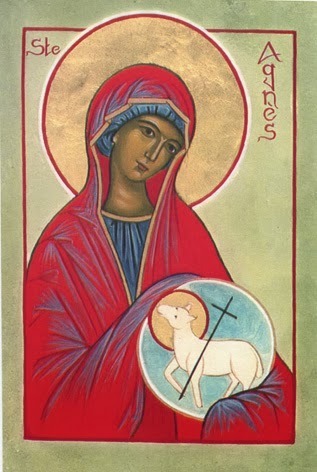 It may be said that the spirit of the early fourth century martyr St. Agnes of Rome has so pervaded the Christian traditions of religious and consecrated life that we risk taking her foundational witness for granted.
It may be said that the spirit of the early fourth century martyr St. Agnes of Rome has so pervaded the Christian traditions of religious and consecrated life that we risk taking her foundational witness for granted.This heroic young girl was more than a martyr during the last great persecution of pagan antiquity. Her motive in giving her life for Christ had a special focus: she presented in a personal and also public manner a witness to the mysterious new way of loving that Jesus had made possible for the heart of a woman. "My Lord Jesus Christ has espoused me with his ring; he has crowned me like a bride" proclaims the ancient antiphon. In another liturgical text, she speaks these words while dying: "What I longed for, I now see; what I hoped for, I now possess; in heaven I am espoused to him whom on earth I loved with all my heart."
Since the days of the New Testament, women had sacrificed the possibility of marriage and motherhood in order to follow Jesus in a deeper way. But St. Agnes gave physiognomy and voice to consecrated virginity as a marriage to Jesus, a singular spousal dedication to him that engages a woman's heart completely, beyond the competition of all human interests and even life itself.
The radiant life and sacrifice of a 12 year old girl, and no doubt her continual intercession thereafter, have fostered an awareness in the Church of her own deepest life.
"I am espoused to him whom the angels serve; sun and moon stand in wonder at his beauty." There are various stories about St. Agnes, but what is certain above all is the singular ardor with which she embraced martyrdom when it was imposed upon her. The words she speaks in the liturgical tradition are not attributions placed on her lips by some later "theological" development. They are echoed in the fourth century homilies and writings of St. Ambrose, Pope St. Damasus, St. Jerome, St. Augustine, and others. St. Agnus was venerated from the beginning by the clergy and the people of Rome, and then throughout the Western Church and also in the Eastern Churches.
The words she speaks in these ancient liturgical texts bear witness to an extraordinary charism, to a new ideal that transcended the boundaries of every kind of human love and transfigured the openness and intensive affectivity that are at the depths of every woman. The Christian virgin was not like the pagans of Rome or other ancient cultures, when women set themselves apart only for a time, and whose service was something less that a total dedication of the interiority of their persons.
The Christian virgin consecrates herself completely. She reserves that personal secret that women possess in an especially intimate way (her "purity") for Jesus alone and exclusively, body and soul. She dedicates entirely her fruitfulness and nurturing qualities of body and soul to Jesus and the grace he gives through the Holy Spirit.
We must try to appreciate the fact that St. Agnes showed the world a kind of life, a freedom, an originality, a way of giving and loving that were new for human beings, and especially for women, in the long and tired history of the human race. She indicated that women are cherished, ultimately, in a way no one had ever imagined.
She displayed the transcendent passion, creativity, and freedom of belonging to Jesus. St. Ambrose speaks thus of her martyrdom:
As a bride she would not be hastening to join her husband with the same joy she shows as a virgin on her way to punishment, crowned not with flowers but with holiness of life, adorned not with braided hair but with Christ himself. In the midst of tears, she sheds no tears herself. The crowds marvel at her recklessness in throwing away her life untasted, as if she had already lived life to the full.Adorned with Christ himself, she had already lived life to the full....
The witness shines brightly to the fact that for the spouse of Christ, nothing is lost. The sacrifices that are made do not express contempt for the goodness of earthly life, but rather the ecstasy of a love that seeks the Source of all goodness, and thereby finds a hundredfold of fruitfulness even for the life of this earth.
St. Agnes, a young girl, a virgin, who flew to Jesus all at once in the recklessness of love, lived so fully that her presence and solicitude continue to this day. For seventeen hundred years, women have followed her example and given their whole selves to Jesus, loving him as their Spouse in prayer and seclusion, and also by serving him in those in need.
We call them nuns and sisters. We even call them "mothers." Today, more and more, we call them our friends and colleagues too, whether in religious habit or as lay women who consecrate themselves in the context of the many new charisms that the Spirit is giving to the Church of our time.
They have sought God and followed the lamb. And in this giving of themselves, they have been the colossal protagonists, the shining stars of love and hope, the bearers of peace and compassion to this world as well.
Agnes stands as one of the pillars of the greatest "women's movement" of all time, and her witness today remains as compelling as ever. She gave up marriage on this earth and everything else even to life itself. And in Christ she became a true mother to generation after generation of daughters to this day -- of women who want to give themselves away beyond the reckoning of this age, and thus live life to the full.
Published on January 21, 2014 15:25
January 20, 2014
The Snowstorm Has My Official Permission
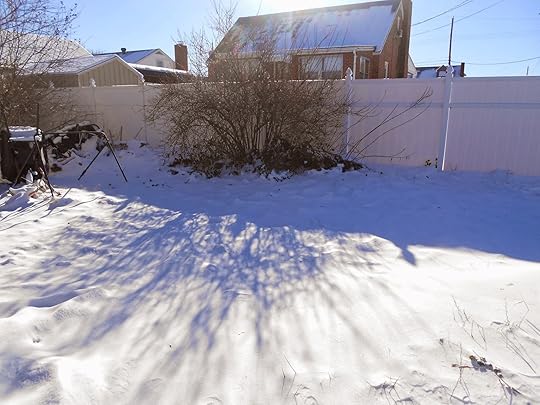 We've had a couple of good snowfalls this season, and I've taken more than enough pictures of the magical stuff. Snow. How cozy.
We've had a couple of good snowfalls this season, and I've taken more than enough pictures of the magical stuff. Snow. How cozy.Okay, I've had enough. Can we have Spring now?
Eh, it's only January 20.
Jan. U. Ary. Goes on and on and on and on.
Finally, it comes to an end, only to be succeeded by... February!
There's the useless nonsense with the groundhog. Did he see his shadow, or not, or did he see dancing pigs with wings? It doesn't matter. It always means the same thing: SIX. MORE. WEEK. Of Winter.
But never mind that. Right now it's still January. And another blizzard is coming our way. "Winter Storm Henrietta" or something like that? More snow. The novelty has definitely worn off.
Still, it's not likely to heed my objections. So it's best to look on the bright side.
Snow is pretty. Snow is fun for children. Snow gets on the walkways and driveway, but now I have a big strong young man in my house who can shovel it (as long as we let him consume half the refrigerator).
 Snow gives us all a chance to spend time together. No homework. No teacher prepping. The white wet deluge pours out of the sky and swirls in the wind, while we stuff a towel at the foot of the door to bolster the insulation so we can stay dry, warm, and comfy inside. We drink cocoa and watch classic episodes of I Love Lucy.
Snow gives us all a chance to spend time together. No homework. No teacher prepping. The white wet deluge pours out of the sky and swirls in the wind, while we stuff a towel at the foot of the door to bolster the insulation so we can stay dry, warm, and comfy inside. We drink cocoa and watch classic episodes of I Love Lucy. Then when the storm is over, the kids go out and later the bathroom fills up with wet winter coats. It's a happy time.
So, okay, I guess I approve. As long as we don't lose (a) the internet; (b) electric power; (c) cable; or (d) food and water. In that order. Winter Storm, you may proceed: Let it snow, let it snow, let it snow!
Published on January 20, 2014 19:00
January 19, 2014
Seek God in Every Human Life
 What would our lives be like if we really believed that the grace of God is at work, mysteriously, in the heart of each and every human person we meet? What if we could look at every human person the way Jesus is looking at them in that moment. We know it is true, that the most wretched, horrible, ugly, disgraceful, malicious, violent, evil human beings on this earth at this moment are loved by Jesus with an inexhaustible passion. We know that he seeks each of them, that he is under the weight of all their horror, that he has borne it all and is in himself the source of a transforming grace that can, in the flash of a millisecond of freedom that permits it, wipe away all the guilt of every imaginable sin and engender a response of love that utterly changes the person. Mercy does not eliminate justice, because every sin has been atoned for by Jesus. Every sin. Never give up on Jesus!
What would our lives be like if we really believed that the grace of God is at work, mysteriously, in the heart of each and every human person we meet? What if we could look at every human person the way Jesus is looking at them in that moment. We know it is true, that the most wretched, horrible, ugly, disgraceful, malicious, violent, evil human beings on this earth at this moment are loved by Jesus with an inexhaustible passion. We know that he seeks each of them, that he is under the weight of all their horror, that he has borne it all and is in himself the source of a transforming grace that can, in the flash of a millisecond of freedom that permits it, wipe away all the guilt of every imaginable sin and engender a response of love that utterly changes the person. Mercy does not eliminate justice, because every sin has been atoned for by Jesus. Every sin. Never give up on Jesus!God is in everyone’s life.Even if the life of a person has been a disaster,even if it is destroyed by vices, drugs or anything else,God is in this person’s life.You can, you must try to seek Godin every human life.Although the life of a personis a land full of thorns and weeds,there is always a spacein which the good seed can grow.You have to trust God.
Pope Francis
Published on January 19, 2014 10:51
January 17, 2014
Affirming the Embrace
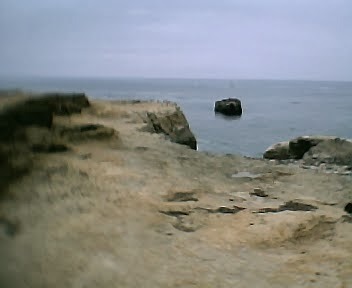 "What others think or don't think of how much you do does not matter, nor does your judgment of yourself. All that matters is that mercy has taken you for ever, from the origin of your existence. Mercy called you to love, because mercy loved you.
"What others think or don't think of how much you do does not matter, nor does your judgment of yourself. All that matters is that mercy has taken you for ever, from the origin of your existence. Mercy called you to love, because mercy loved you.
"Holiness means always affirming -- before everything else, in everything else -- the embrace of the Father, the merciful, pitying movement of Christ, his gesture, that is he himself, independent of everything that stirs and has the appearance of life in us" (Luigi Giussani, The Psalms, pp. 185-186).
Published on January 17, 2014 20:50
January 15, 2014
Lost in the Valley of the Shadow
 We are the sheep of the good shepherd. Very often, we find ourselves lost and alone, far from the good pasture, wandering in dark places.
We are the sheep of the good shepherd. Very often, we find ourselves lost and alone, far from the good pasture, wandering in dark places.But even when we walk in the valley of the shadow of death, we must not give in to fear, for he is with us. We hold close to him in faith, a faith that comes to life through the breath of love, however faint that breath may be.
“You are with me; your rod and your staff, they comfort me” (see Psalm 23:4).
The rod and the staff may thrash the sheep like heavy blows in order to prevent the sheep from thrusting himself blindly in and out of the thickets of that valley of shadows. The sheep may have to endure the hard stinging snaps of the shepherd staff again and again, because his staff is the only thing the sheep can feel in the darkness, and the shepherd is determined not to lose the sheep; indeed he is determined to keep the sheep as close to himself as possible.
It is probably in the most terrified and the most lost moments of the journey, when we are bleeding from so much running away and rolling in the brambles, that he raises us up and carries us on his shoulders. And we bleat and thrash and struggle because he locks our legs together in his strong hands. It is good that he is so strong. He is stronger. Love is stronger.
We must never lose our trust in God. We must hold on to him, in the midst of the fury, with our understanding wherein we know by faith that his promise is true, with our love wherein we already know that his mercy is at the end of all things.
Published on January 15, 2014 20:30



